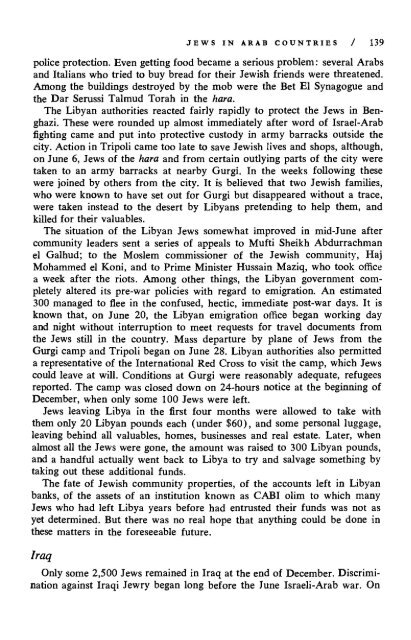1968_4_arabisraelwar
You also want an ePaper? Increase the reach of your titles
YUMPU automatically turns print PDFs into web optimized ePapers that Google loves.
JEWS IN ARAB COUNTRIES / 139<br />
police protection. Even getting food became a serious problem: several Arabs<br />
and Italians who tried to buy bread for their Jewish friends were threatened.<br />
Among the buildings destroyed by the mob were the Bet El Synagogue and<br />
the Dar Serussi Talmud Torah in the hara.<br />
The Libyan authorities reacted fairly rapidly to protect the Jews in Benghazi.<br />
These were rounded up almost immediately after word of Israel-Arab<br />
fighting came and put into protective custody in army barracks outside the<br />
city. Action in Tripoli came too late to save Jewish lives and shops, although,<br />
on June 6, Jews of the hara and from certain outlying parts of the city were<br />
taken to an army barracks at nearby Gurgi. In the weeks following these<br />
were joined by others from the city. It is believed that two Jewish families,<br />
who were known to have set out for Gurgi but disappeared without a trace,<br />
were taken instead to the desert by Libyans pretending to help them, and<br />
killed for their valuables.<br />
The situation of the Libyan Jews somewhat improved in mid-June after<br />
community leaders sent a series of appeals to Mufti Sheikh Abdurrachman<br />
el Galhud; to the Moslem commissioner of the Jewish community, Haj<br />
Mohammed el Koni, and to Prime Minister Hussain Maziq, who took office<br />
a week after the riots. Among other things, the Libyan government completely<br />
altered its pre-war policies with regard to emigration. An estimated<br />
300 managed to flee in the confused, hectic, immediate post-war days. It is<br />
known that, on June 20, the Libyan emigration office began working day<br />
and night without interruption to meet requests for travel documents from<br />
the Jews still in the country. Mass departure by plane of Jews from the<br />
Gurgi camp and Tripoli began on June 28. Libyan authorities also permitted<br />
a representative of the International Red Cross to visit the camp, which Jews<br />
could leave at will. Conditions at Gurgi were reasonably adequate, refugees<br />
reported. The camp was closed down on 24-hours notice at the beginning of<br />
December, when only some 100 Jews were left.<br />
Jews leaving Libya in the first four months were allowed to take with<br />
them only 20 Libyan pounds each (under $60), and some personal luggage,<br />
leaving behind all valuables, homes, businesses and real estate. Later, when<br />
almost all the Jews were gone, the amount was raised to 300 Libyan pounds,<br />
and a handful actually went back to Libya to try and salvage something by<br />
taking out these additional funds.<br />
The fate of Jewish community properties, of the accounts left in Libyan<br />
banks, of the assets of an institution known as CABI olim to which many<br />
Jews who had left Libya years before had entrusted their funds was not as<br />
yet determined. But there was no real hope that anything could be done in<br />
these matters in the foreseeable future.<br />
Iraq<br />
Only some 2,500 Jews remained in Iraq at the end of December. Discrimination<br />
against Iraqi Jewry began long before the June Israeli-Arab war. On


